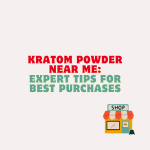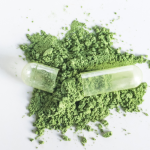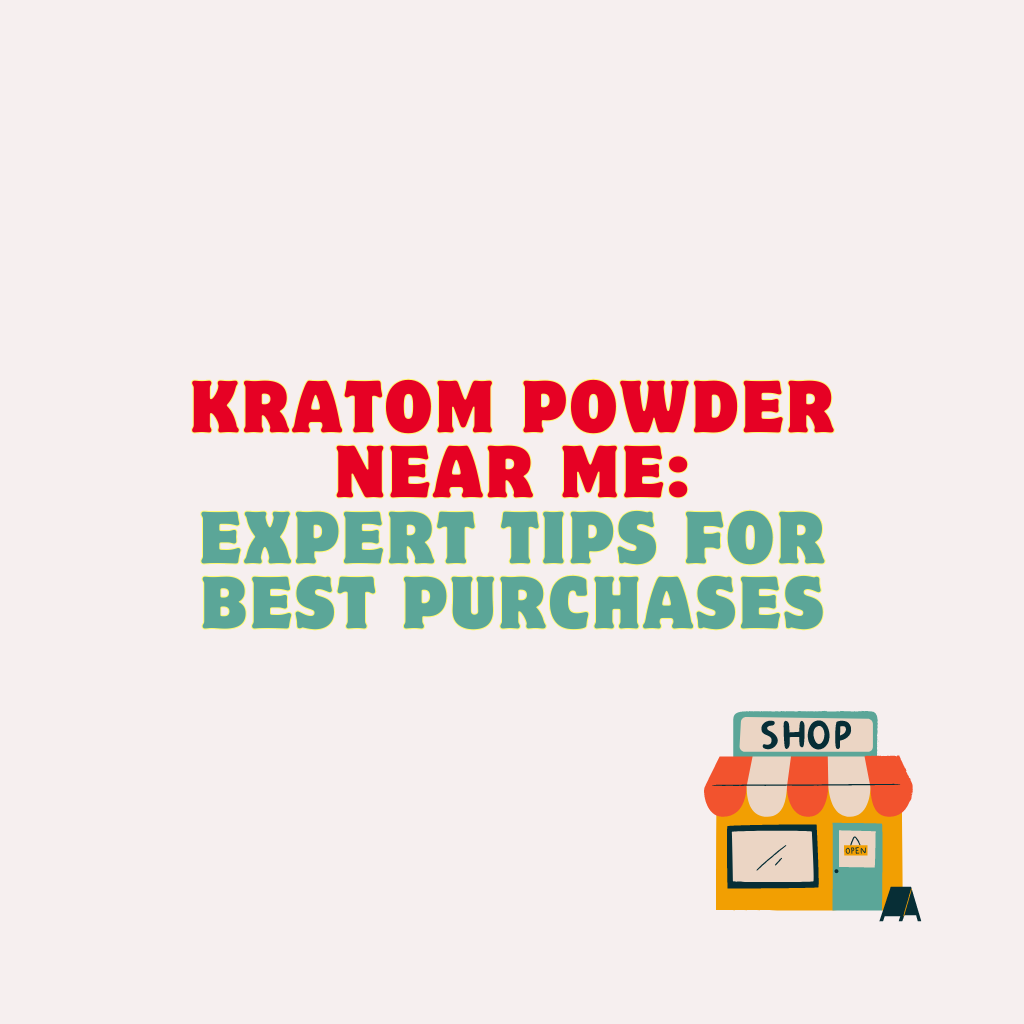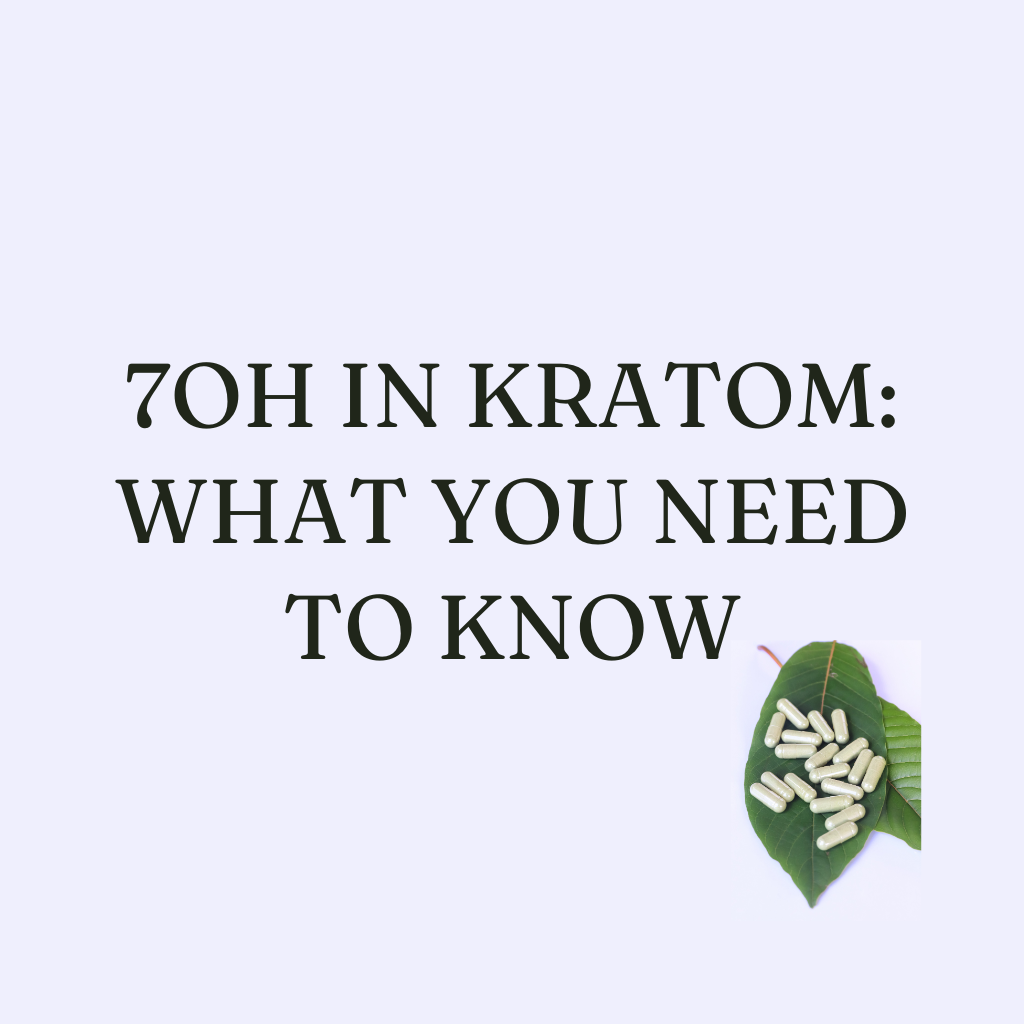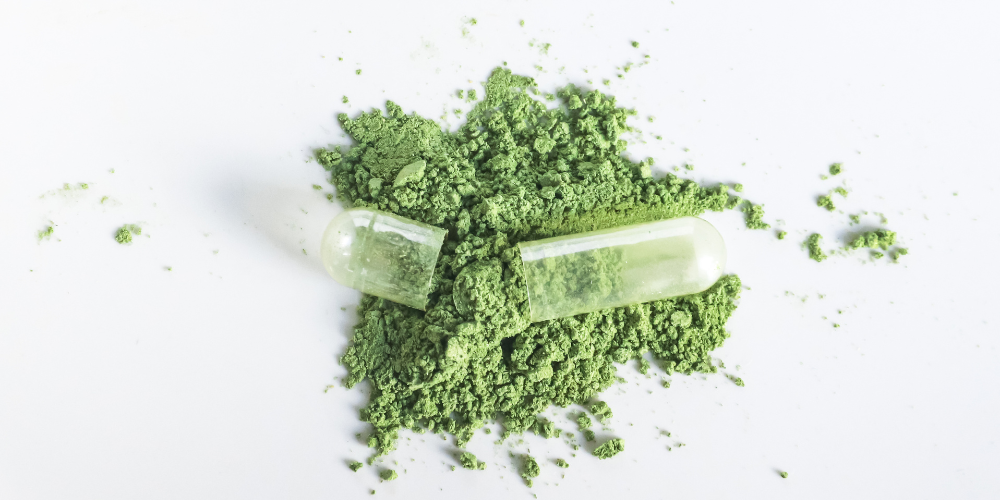
Free Shipping on Orders Over $75!
JOIN OUR EMAIL LIST FOR 20% OFF, weekly coupons up to 30% OFF
Kratom vs. Hydrocodone: Differences, Side Effects & Where To Get Them
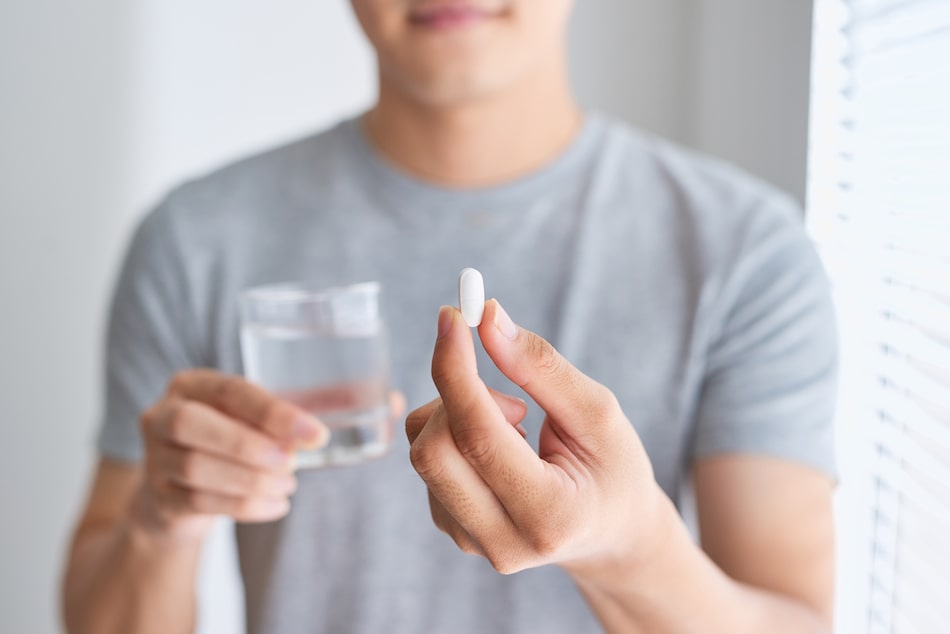
A comparison and contrast between Kratom vs Hydrocodone. We’ll talk and learn about the basics of these substances. Figure out their pros and cons and find out about the short and long-term side effects to users.
A lot of people experience and suffer from extreme levels of pain that are caused by various of reasons like surgeries or health conditions. This results in people subscribing to different substances to gain some comfort. Whether you are already familiar with chronic pain or just recently in extreme pain, you would have encountered Kratom and Hydrocodone.
Kratom and Hydrocodone have been used by thousands if not, millions of people because of their powerful stimulating effects. There’s a lot of comparison between the two because they are so similar. But, there are some noticeable differences to consider. In this short read, I’ll do my best to answer all of the questions you’re most likely wondering about.
Hydrocodone is a semi-synthetic opioid painkiller while kratom is a natural opioid-like supplement used to energize, soothe, and uplift mood. They are both often used for the same purposes and can provide similar effects, but differ in their long-term side effects. Kratom’s effects are also known to last shorter than hydrocodone’s effects.
One might wonder which is better to use so without leaving you wondering any longer, let’s get right into the comparison first!
What are the Similarities?
Believe it or not, people often think hydrocodone and kratom act very similarly to one another. Hydrocodone is considered as an opioid while kratom gives off opioid-like effects and has opioid properties. Both of these also react with opioid receptor in your head.
That’s why users sometimes combine the two, but more on that later. Well, I’m not that surprised. The neurological mechanisms work almost the same, thus providing mirrored effects.
Effects

Most kratom and hydrocodone users describe the same type of effects from both. Here are some of them:
- Soothing
- Stimulating
- Relaxing
- Mood-boosting
- Euphoric
- Overall Sense of well-being
- Pain relief
The main use of both is often to soothe any physical discomfort. But, people also love them for their euphoric and feel-good effects. After all, the world is really stressful at the moment. It’s no wonder people can easily abuse using both kratom and hydrocodone.
Tolerance can build up quickly for each, especially if used on a daily basis. The kratom and hydrocodone effects start to wear off at the usual dose and more is often needed to feel those same desirable effects.
Mechanisms
Kratom’s alkaloids attach to mu-opioid receptors in the brain which allow the body to feel relaxed and soothed. The activation of these receptors also increases dopamine, allowing the user to feel euphoric, happy, and give an overall sense of well-being.
The same can be said about Hydrocodone. Hydrocodone’s chemical properties bind to opioid receptors in the brain, of course, one of them being the mu-opioid receptors. This sends signals throughout the body to relieve any pain while increasing dopamine and making the person feel good.
Is there any wonder why kratom users describe opioid-like benefits? I think we can see why it’s so great!
Differences Between Kratom and Hydrocodone?
Forms
The semi-synthetic opioid drug hydrocodone comes in two types of forms- oral tablets and oral solutions. It also doesn’t have a bitter taste like kratom.
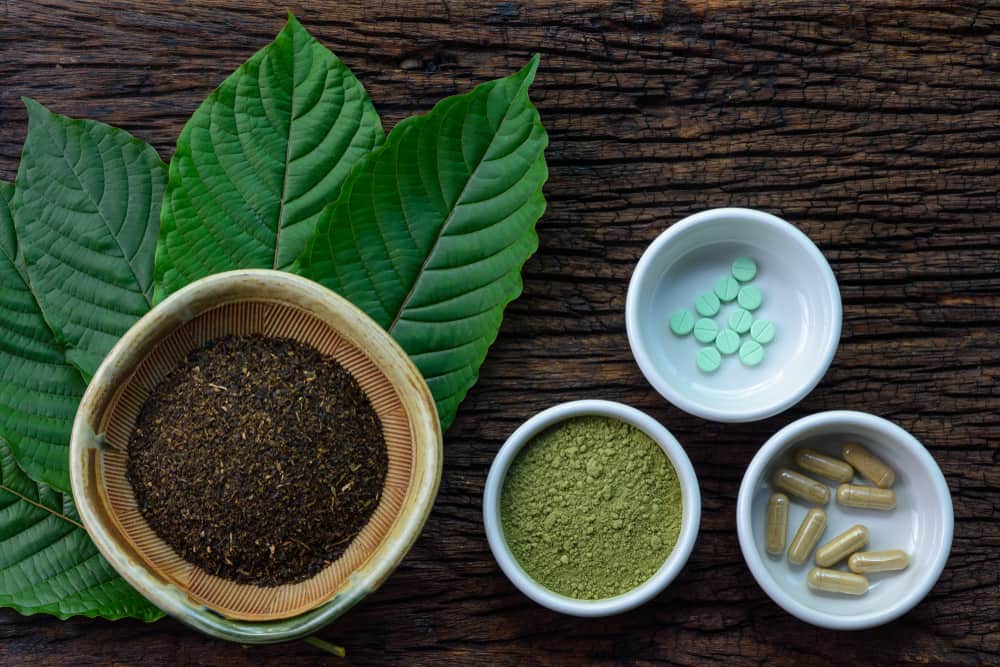
Kratom, on the other hand, comes in a variety of forms. It comes in the traditional powdered form (which can be simmered into a tea or taken with juice/water), capsules, tinctures, and more. What I like is that there are different ways to enjoy it and you’re not limited to one or two methods of consumption. The downside is kratom is infamous for tasting terrible. For that, I recommend getting the capsules.
How Long They Last
Hydrocodone has some long-lasting effects. It’s said to last up to 8 hours! On the other hand, kratom’s effects don’t match up. Kratom doses typically lasts anywhere between 2-5 hours. The more potent strains will give you around 3-5 hours.
I’ll have to give hydrocodone extra points on this one.
Short and Long-Term Side Effects
Unfortunately, kratom addictions and opioid addictions do happen. Opioid addiction is an epidemic in the United States. There have been reports of kratom overdose and hydrocodone overdose.
Short-term side effects might not be as dangerous, but long-term heavy use can cause risky and life-threatening side effects. Here’s a quick list of kratom and hydrocodone’s side effects.

Hydrocodone
Short-term effects:
- Nausea
- Headaches
- Trouble sleeping
- Decrease in blood pressure
- Decrease in heart rate
- Lightheadedness
- Etc.
Long-term side effects:
- Liver damage
- Respiratory Issues/diseases
Kratom
Short-term effects:
- Tremors
- Increased heartbeat
- Sweating
- Hallucinations
- Increased anxiety
- Nausea
- Vomiting
- Etc.
Long-term side effects:
- Psychosis
- Anorexia/Weight Loss
So far, there isn’t any evidence that suggests kratom causes organ damage or other bodily parts.
Aside from these side effects, users who suddenly stop using them after a long period of time experience withdrawal. Some withdrawal symptoms are:
- Insomnia
- Irritability
- changing moods
- Depression
- Anxiety
- aches
- Cravings
- Fatigue
- Hallucinations
- Nausea
- Etc.
Legality / Where to Get Them
Hydrocodone is a prescription drug. It’s illegal to buy this drug without a prescription. Often, this would be prescribed by a physician to a patient after major skeletal surgeries. One example of hydrocodone is Vicodin.
Kratom, on the other hand, is legal in most states. Unfortunately, kratom is not legal to those living in Arkansas, San Diego County (California), Indiana, Franklin City (New Hampshire), Rhode Island, Tennessee (only synthetic kratom is banned), Vermont, and Wisconsin.
Kratom can be purchased online and you don’t need a prescription! It’s much more accessible than hydrocodone.
Quick Overview
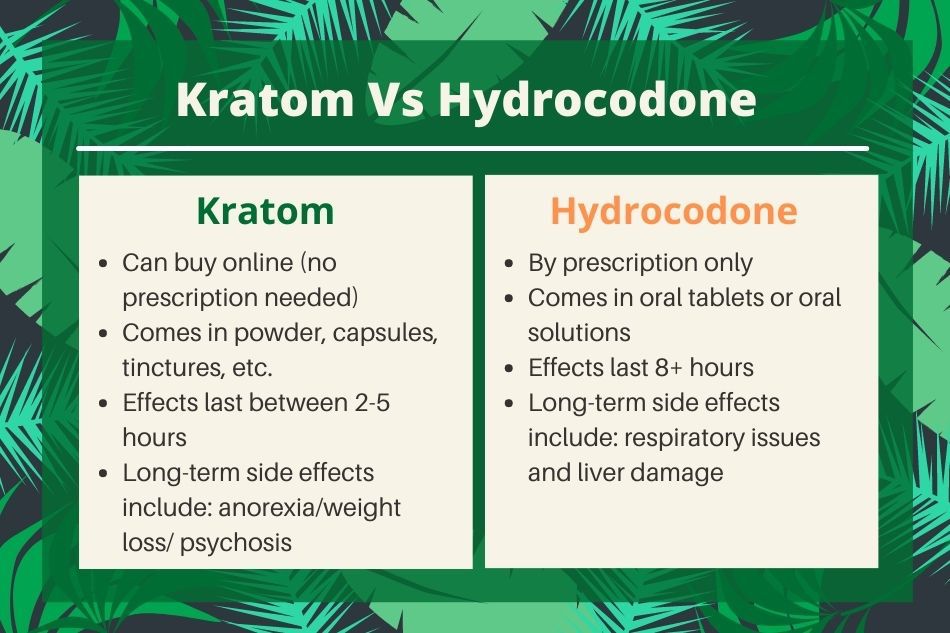
Reddit User Reviews
When it comes to user’s experiences, Reddit has some great insight into what people are saying about taking kratom and hydrocodone.
Here are some real opinions and experiences:
“I agree. After taking Kratom for a couple years, I had surgery and was prescribed hydro. Kratom feels a lot stronger to me.” -Sdubb33
“In my experience they negate each other, or cancel out. If you don’t like hydro, stick to kratom. But if you’ve already taken hydro today chances are you won’t feel much from kratom and vice versa. That’s how it goes for me anyway.” -BigBucs731
“Just got a script a bit ago and didn’t enjoy it as much as my normal burn. There are def compounds in kratom that regulate whatever you can feel from an opiate… being oxys or the 7hyxohm in the leaf. A couple years ago more was always more for the pill… now over a year in Im learning less is somehow more with this plant, still trying to wrap the ole noggin around it lol” -edens_architect
What Exactly is Hydrocodone?
As mentioned, hydrocodone is a semi-synthetic prescription opioid drug that’s often used by those who have pain. It can become addicting and become potentially dangerous if abused.
Since it’s semi-synthetic, this makes hydrocodone a lab-made pain reliever. The chemical properties of this drug bind to opioid receptors and activates dopamine. The effects are long-lasting and make the person feel happier and soothes pain.
What is Kratom All About?

Kratom is an evergreen tropical tree that can be found in different countries within Southeast Asia. The leaves are picked off the tree once they’ve matured, and go through a long drying process.
The kratom leaves become ground-up into powder once they’re fully dried and matured. The alkaloids within kratom attach to mu-opioid receptors, which give off similar effects to opioids. The downside is that one’s tolerance can build up quickly when taking too much kratom. Also, the effects don’t last as long as prescription drugs. It’s an overall good option for those seeking a natural alternative.
Can You Take Kratom and Hydrocodone?
I wouldn’t recommend taking both, just because I can’t say that it would be 100% safe, nor am I a doctor.
But, what I can tell you is that some people take both. Most of those who do often find that they don’t really work well with each other. In other words, the kratom counteracts the hydrocodone and cancels it out. It’s almost as if they’re only using the kratom.
This results in some users taking a much higher dosage for hydrocodone to feel the effects of both and to give stronger results. I don’t suggest this because a higher dosage of hydrocodone can cause negative side effects and could be dangerous.
Always consult with your doctor before mixing prescription drugs with anything.
How You Can Potentiate Kratom
If you’re new to kratom or want to stick to kratom, there are some great ways to potentiate kratom and possibly give you stronger effects.
Here are 4 ways to boost your favorite kratom strain:
- Citrus: Grapefruit and lemon are often used to help break down the kratom faster in your body and increase the potency of the effects. You can squeeze the juice of either one (or both) while simmering the tea or just drink it while you take kratom.
- Chamomile: Chamomile tea is an all-time favorite for those who want to feel relaxed and help them sleep at night. If you’re looking to increase the relaxation and calming effects you get with certain kratom strains, you can add kratom powder into your chamomile tea before bed.
- Coffee: This is one that’ll you’ll want to be careful with. You can get away with drinking some coffee with your kratom. However, you might not want to take too much or drink anything loaded with caffeine. This can give you some unwanted side effects if overdone.
- Turmeric: It’s been said by many that turmeric helps boost the effects of kratom along with its longevity. Try adding organic, ground turmeric powder into your kratom tea or you can take turmeric capsules along with your kratom capsules.
Takeaway
Substances like hydrocodone and kratom are a huge help to those who are in severe pain. However, users should be mindful of what pain killer they are taking. Hydrocodone should only be used when suggested by a medical expert. It should also be used for only a short period of time. Kratom should be used with caution as well.
Comparing these two, I suggest kratom for those who are looking to manage their chronic pain. It’s easier to access and has flexible forms. You can also combine it with other ingredients. Hydrocodone is highly recommended when recovering from medical conditions (doctor prescribed).
But the bottom line when choosing between the two is to look into what works best for you. Always listen to medical experts and make sure to have a support group. A support group will help you stay away from addiction and help you in the whole recovery process.
Did like a post? Share it with:
nimesh
Search
Table of Index
Post Categories
Related Posts
Where to buy kratom near me is a question that many users find themselves asking when looking for quality products
Finding the best Kratom Powder near me can feel difficult with so many options available locally. But steering through stores
Are you one of those scrolling on the internet for ‘7ALKS near me’? Are you looking for 7ALKS, 7-Hydroxy 15mg
7OH, or 7 hydroxymitragynine, is a significant alkaloid found in kratom that plays a crucial role in its effects. This
Curious about 7OH kratom? You’re not alone. As more people explore different botanical products, 7 hydroxymitragynine (7OH) has emerged as
Have you ever accidentally over-consumed kratom and experienced a hangover? Well, the good news is they’re easily avoidable. A kratom
Disclaimer
Must be 21 years or older to purchase kratom. Products are not for internal use. The US FDA Has Not Approved Kratom as a Dietary Supplement. We do not ship to the following states, cities and counties in the US where Kratom is banned Alabama, Arkansas, Indiana, Rhode Island, Tennessee, Vermont, Wisconsin. Sarasota County, Union County, Denver, San Diego. All sales should be 100% U.S. sales only.
Consult with a medical professional before use if taking prescription medication or affected by a serious medical condition. Always seek medical advice before using this or any other supplemental dietary product. These statements have not been evaluated by the Food and Drug Administration (FDA).
© 2025 Kratom Krush. All Rights Reserved.Privacy PolicyTerms & Conditions


